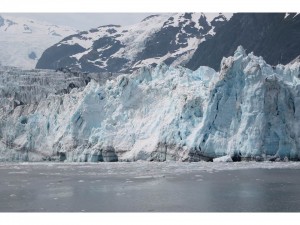The US-IALE conference in Anchorage was short but sweet — great science, wonderful colleagues, and new ideas.
However, as picturesque as the setting was, it was deeply unnerving. This winter was one of the warmest on record for Alaska, and indeed for much of the past winter, Alaska was warmer than much of the eastern US. When I arrived in Anchorage, it was at least 20 degrees (F) warmer than Houghton had been, and the trees were already fully leafed-out and blooming. Several wildfires contributed to a haze around the city that marred views and made our clothes smell like a campfire; the fire season started early and is expected to be a severe one, thanks to warm weather and dry conditions in the forests.
My son and I went on a glacier tour…. truly impressive! The blue hues and striations of black sediment made them far more beautiful than I had imagined. As we watched one of the glaciers calving, I wondered if any of those glaciers would be around for my son to show his children; odds are against it. Many speakers at the conference spoke of the difficulty that our “no analog” future presents us when we try to develop management plans for our ecosystems more than a few decades out. While they were talking about the vast reorganization of species and ecosystems that we are likely to see, I thought about how I might describe things like glaciers and tundra to my grandkids….. I am certain that my words, and even my photos, won’t do them justice.
